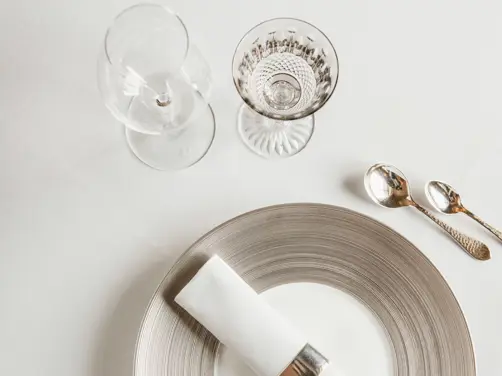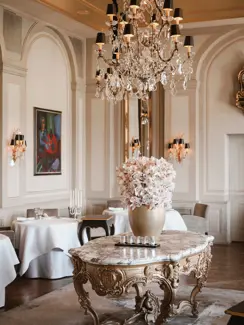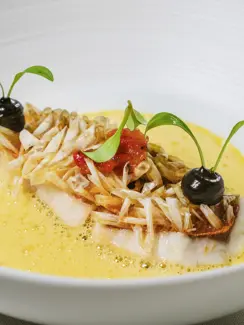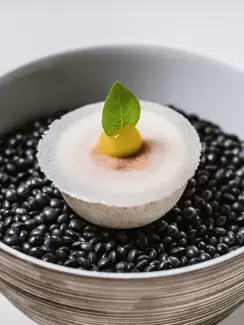Spoons full of happyness
Peter Knogl has transformed the Cheval Blanc in the Grand Hotel Les Trois Rois in Basel into one of the best classic restaurants in the world. When you talk to him, you quickly realise why this is the case.


The sauce spoon is the most important utensil when sitting down to eat at Peter Knogl’s table. This is because it would be sacrilege to waste even a drop of one of his sauces. Knogl succeeds in enriching the great French classics with Asian and Mediterranean flavours in such an exciting way that you mourn every creation you’ve eaten – and wistfully scrape up its last remnants with said sauce spoon. But when the next dish arrives, your eyes light up again and you find yourself shuffling your feet under the table in anticipation.
The Michelin Guide honours Knogl’s restaurant, the Cheval Blanc in Basel’s Grand Hotel Les Trois Rois, with three stars, and Gault-Millau also awards it the highest rating: 19 points. However, the biggest compliment comes from a colleague. Benjamin Parth, 5-toque chef from Restaurant Stüva in Ischgl and usually not at a loss for critical words, says that he has eaten at Knogl’s restaurant almost twenty times and is always enraptured by his creations.
The famous red mullet with crispy scales, saffron sauce, a tomato vinaigrette and black garlic brings together everything that characterises Knogl’s cuisine: complexity combined with straightforwardness, a perfect balance, an unerring confidence when tasting the food, the highest demands on the product and an exciting mouthfeel. To make the scales edible and crispy, Knogl places them on a grid and pours hot oil over them. A welcome side effect is that the fat from the fish is rinsed away and – unlike in the pan – does not settle.


If you speak to former members of the Cheval Blanc team about Knogl, they remember a strict and demanding boss, but one who demands the most of himself and passes on an enormous wealth of knowledge to everyone involved. Dominik Sato, now the culinary mastermind at the 2-star restaurant The Japanese in The Chedi hotel in Andermatt, for example, says that Knogl had been the best teacher imaginable for sauces and fish. Hardly any other word fits Peter Knogl better than ‘uncompromising’. Every plate that leaves the kitchen has to pass his watchful eye. Day-long absences, which are becoming increasingly common among the stars of the scene, are out of the question for the head of Cheval Blanc. And if a delivery does not fully meet his expectations, he has it returned immediately. Here is a little anecdote aside: Knogl discovered two of his employees in the scullery of the Trois Rois. This is down to the fact that he always looks beyond the obvious solution with his attentive eyes. Ahmad, who had to flee Afghanistan to escape the Taliban, has been at Cheval Blanc for five years and coordinates the service processes from the kitchen; John, who comes from South Sudan, looks after the guests at the table with a great deal of expertise and warmth.
Knogl sources the fish for his restaurant exclusively from France. ‘The conditions in Brittany are excellent and the fishermen are very careful with their catch,’ he explains. In addition to red mullet, he particularly loves turbot, which he serves with tomato and basil, for example, but he is not a huge fan of John Dory. ‘It’s not because I don’t like the fish, but because it’s hard to get it in the required quality and the flavour is affected if it is left to stand at the pass for a few seconds too long.’ At home, however, Knogl treats himself to a John Dory. ‘I serve it straight from the pan to the plate.’ Knogl, perhaps the best classical chef in Europe, grew up in Deggendorf, Bavaria, as the child of a farming family. From as early an age as six years old, he had to help out on his parents’ farm before school and absorbed the idea that if you want to achieve something, you have to work for it. Of course, even someone as passionate and hard-working as Knogl needs to relax from time to time. When he does, he travels to his former adopted home of Spain (‘I lived there for over ten years’) and enjoys being close to the sea. ‘I’ve always felt drawn to the sea,’ he says, ‘both as a person and as a chef.’


Words Alex Kuehn







